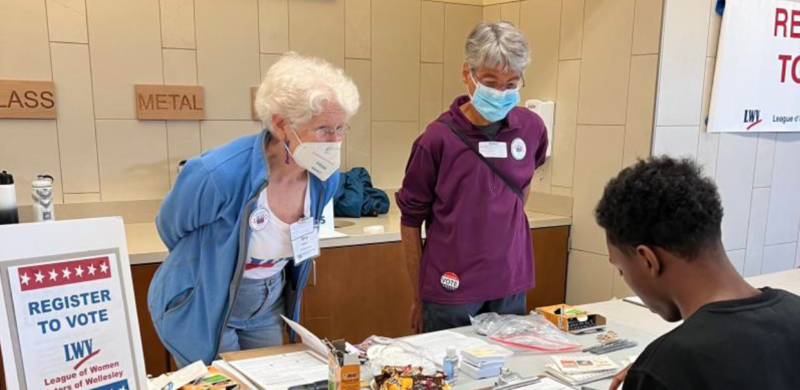For over a century, the grassroots organization League of Women Voters (LWV) has worked to advocate for democracy by providing minority groups with access to political spheres they historically have been excluded from.
The League was founded in 1920, six months before the 19th amendment was ratified. First led by suffragists aiming to guide women through the voting process, local LWV branches have since formed across the country. These groups each focus on area-specific concerns from affordable housing to education reform.
Bonny Nothern, a legislative envoy for the League of Women Voters in Wellesley (LWVW), made clear that as a nonpartisan organization, the League does not affiliate itself with any political party, but rather supports initiatives.
This year, the group is supporting two pieces of legislation at the national level: the Equal Rights Amendment, which would guarantee gender equality in legal matters, and the DISCLOSE Act, which would increase financial transparency in politics.
At the local level, the group recently covered the 2023 town election. It hosted a Meet the Candidates Night on February 16, a month before the election on March 7. Flyers about the election seeking to encourage voting and inform residents of their options were also posted around town.
Voters can use the League’s election guide website for guidance through all voting processes in Massachusetts. The guide features four multilingual call lines, information on voting locations, and deadlines for upcoming voter registration. Voters can opt in to receiving personalized voting information specific to their location and interests. Along with overviews of all candidates, the League provides the community with the opportunity to attend LWV-held discussion forums prior to elections.
“How are you going to vote for somebody if you’ve never even seen them or heard them speak? So we set [these forums] up and make sure every candidate is given an opportunity,” said Nothern.
Marguerite Chatelier, programming director of the Wellesley League, emphasized the importance of equal representation amongst the candidates, saying that they aim to provide the community with fair presentations.
The League actively works to be unbiased both in group discussions and online by moderating meetings, allotting word limits and time constraints on speeches, and checking proposed questions for candidates before they are asked.
“The most important thing is fairness — that each person has their say,” said Chatelier.
Though the League’s original goal was to promote women’s participation in government, today, the emphasis is more on voter participation as a whole. Anyone can become a LWV member, regardless of age or gender.
Ivy Wang ’24 is on the board of LWVW and works as the director of social media. She also serves as an elected member of Town Meeting, which relates to her work in the League and helps her understand Wellesley politics on a unique level.
“The League allows us to speak out within our community, which is a really cool opportunity,” said Wang.
LWVW urges students to participate in government by pre-registering to vote, taking part in Town Hall activities, and sitting in on question committees where they might contribute their thoughts on high school issues.
“There is so much we can do at the high school level to just be aware of the information that our town government is discussing. It empowers you. If you have a better understanding of the system, you feel you can change it,” said Chatelier.
Nothern believes that if high schoolers are given the opportunity to participate in local governance, they will feel more prepared to vote when the time comes. She also acknowledges that diving into politics as a student can seem daunting, but says social awareness is a fundamental part of life.
“High school students should at least see these processes and see that they can contribute and have confidence in their futures.”

